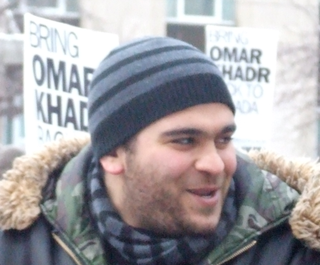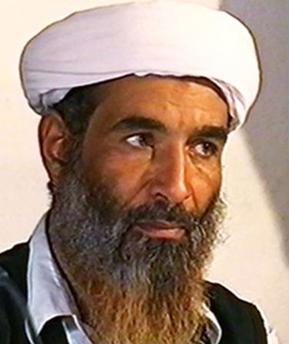Ibn al-Shaykh al-Libi was a Libyan national captured in Afghanistan in November 2001 after the fall of the Taliban; he was interrogated by American and Egyptian forces. The information he gave under torture to Egyptian authorities was cited by the George W. Bush administration in the months preceding its 2003 invasion of Iraq as evidence of a connection between Saddam Hussein and al-Qaeda. That information was frequently repeated by members of the Bush administration, although reports from both the Central Intelligence Agency (CIA) and the Defense Intelligence Agency (DIA) strongly questioned its credibility, suggesting that al-Libi was "intentionally misleading" interrogators.

Mustafa Kamel Mustafa, also known as Abu Hamza al-Masri, or simply Abu Hamza, is an Egyptian cleric who was the imam of Finsbury Park Mosque in London, where he preached Islamic fundamentalist views.

Abdurahman Ahmed Said Khadr is a Canadian citizen who was held as an enemy combatant in extrajudicial detention in the United States Guantanamo Bay detainment camps, in Cuba, after being detained in 2002 in Afghanistan under suspicion of connections to Al-Qaeda. He later claimed to have been an informant for the CIA. The agency declined to comment on this when asked for confirmation by the United States' PBS news program Frontline. He was released in the fall of 2003 and ultimately returned to Canada.

Samir Saleh Abdullah al-Suwailim, commonly known as Ibn al-Khattab or Emir Khattab, was a Saudi Arabian pan-Islamist militant. Though he fought in many conflicts, he is best known for his involvement in the First and Second Chechen War, which he participated in after moving to Chechnya at the invitation of the Akhmadov brothers.

Ahmed Saïd Khadr was an Egyptian-Canadian with alleged ties to al-Qaeda in Afghanistan and Pakistan. His activity in Afghanistan began in response to the Soviet invasion of Afghanistan in 1979, and he has been described as having had ties to a number of militants within the Afghan mujahideen, including Saudi militant Osama bin Laden. Khadr was accused by Canada and the United States of being a "senior associate" and financier of al-Qaeda in Afghanistan.

Abdullah Yusuf Azzam was a Palestinian-Jordanian Islamist jihadist and theologian. Belonging to the Salafi movement within Sunni Islam, he and his family fled from what had been the Jordanian-annexed West Bank after the 1967 Six-Day War and pursued higher education in Jordan and Egypt before relocating to Saudi Arabia. In 1979, Azzam issued a fatwa advocating for "defensive jihad" in light of the outbreak of the Soviet–Afghan War, and subsequently moved to Pakistan to support the Afghan mujahideen.

Abdullah Ahmed Said Khadr is a Canadian citizen whose alleged ties to terrorism resulted in a protracted international legal issue. Born in Canada, he grew up in Pakistan. As the oldest son of Ahmed Khadr, who had ties to the Afghani Mujahideen, Abdullah was sent to the Khalden military training camp as a boy. As a young adult, he allegedly became an arms dealer, selling illicit weapons to militants involved in the War in Afghanistan and related conflicts.
Abu Musab al-Suri, born Mustafa bin Abd al-Qadir Setmariam Nasar, is a suspected Al-Qaeda member and writer best known for his 1,600-page book The Global Islamic Resistance Call. He is considered by many as 'the most articulate exponent of the modern jihad and its most sophisticated strategist'.
The Khalden training camp was one of the oldest and best-known military training camps in Afghanistan. It was located in the mountains of eastern Paktia Province, near Tora Bora.
This article is a chronological listing of allegations of meetings between members of al-Qaeda and members of Saddam Hussein's government, as well as other information relevant to conspiracy theories involving Saddam Hussein and al-Qaeda.
Omar Nasiri is the pseudonym of a Belgian spy of Moroccan origin who infiltrated al-Qaeda, attending training camps in Afghanistan and passing information to the UK and French external intelligence services, the DGSE. He claims in an exclusive interview presented on the BBC's Newsnight programme on 16 November 2006 that the UK intelligence services were warned in the mid-1990s about the threat posed by al-Qaeda, but failed to act quickly enough. He also claims that Ibn al-Shaykh al-Libi deliberately gave interrogators acting on behalf of the United States false information in order to encourage the USA to overthrow Saddam Hussein, thus allowing al-Qaeda to use Iraq as a jihadist base.
Abu Qaswarah al-Maghribi was a Moroccan national who was reportedly the No. 2 leader of Al-Qaeda in Iraq and the senior leader in Northern Iraq. He died in a building in Mosul during a shootout with American troops.
Abu Abdul-Rahman Amine, born Djamel bin Mohamed Zitouni, was the leader of the Algerian Armed Islamic Group (1994–1996), a terrorist group responsible for carrying out a series of bombings in France in 1995. He was killed by a rival faction on July 16, 1996.
Yusuf al-Ayeri or Yusuf bin Salih bin Fahd al-Ayeri was a Saudi Arabian member of Al-Qaeda, and the first-ever leader of al-Qaeda in Saudi Arabia.

Abu al-Layth Ali Ammar Ashur al-Libi was a Libyan militant who was a leader of al-Qaeda in Afghanistan who appeared in several al-Qaeda videos. He was believed to have been active in the tribal regions of Waziristan. He also served as an al Qaeda spokesman. According to the Defense Intelligence Agency, he was an "expert in guerilla warfare."

Abu Yahya al-Libi, born Mohamed Hassan Qaid, was a terrorist and leading high-ranking official within al-Qaeda, and an alleged member of the Libyan Islamic Fighting Group.
Carried out by the Egyptian Islamic Jihad, the 19 November 1995 attack on the Egyptian embassy in Islamabad, Pakistan was retaliation against the diplomatic staffers who were accused of gathering intelligence on Jihad factions inside Pakistan. It was the deadliest attack against the Egyptian government, since it had been declared apostate three years earlier by Islamic militants.
Mustafa Hamid, also known as Abu Walid al-Masri and Hashim al-Makki, is a journalist who in the 1980s fought as an Islamic jihad volunteer during the Soviet–Afghan War. He is reported to have been an al-Qaeda advisor and taught at the Al Farouq training camp in the 1990s. He served as a bureau chief in Afghanistan for Al Jazeera from 1998 to 2001, before leaving for Iran.
Since the late 1990s, several members of the Libyan Islamic Fighting Group had decided to leave the band, most of them joining other armed organizations.

Mohammed Atef was an Egyptian militant and prominent military chief of al-Qaeda, and a deputy of Osama bin Laden, although Atef's role in the organization was not well known by intelligence agencies for years. He was killed in a US airstrike in November 2001.









